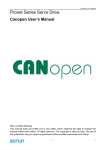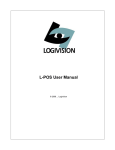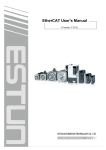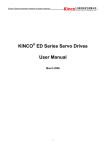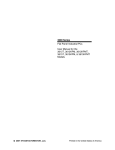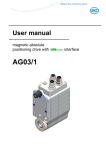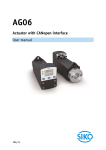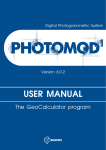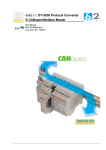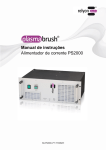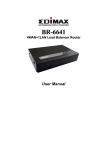Download CANopen User`s Manual
Transcript
7、Control mode EDC series Servo drive CANopen user user’’s Manual Estun Limited Warranty This manual does not entitle you to any rights. Estun reserves the right to change this manual without prior notice. All rights reserved. The copyright is held by Estun. No part of this publication may be copied or reproduced without written permission from Estun. -1- V.1.0 7、Control mode —— Contents —— ........................................................................................................................................ 1 EDC SERIES SERVO DRIVE DRIVE........................................................................................................................................ ....................................................................................................................................... CANOPEN USER USER’’S MANUAL MANUAL....................................................................................................................................... .......................................................................................................................................11 GENERAL INTRODUCTION .................................................................................................................................... 1、GENERAL INTRODUCTION.................................................................................................................................... ....................................................................................................................................44 1.1 CAN MAIN RELATED FILES........................................................................................................................................ 4 1.2 TERMS AND ABBREVIATIONS USED IN THIS GUIDE...................................................................................................4 1.3 CANOPEN GENERAL INTRODUCTION......................................................................................................................... 5 WIRING AND CONNECTIONS ................................................................................................................................ 2、WIRING CONNECTIONS................................................................................................................................ ................................................................................................................................66 CANOPEN COMMUNICATION ............................................................................................................................... 3、CANOPEN COMMUNICATION............................................................................................................................... ...............................................................................................................................88 3.1 CAN IDENTIFIER LIST................................................................................................................................................ 9 3.2 SDO.........................................................................................................................................................................10 3.3 PDO.........................................................................................................................................................................13 3.3.1 PDO parameter.............................................................................................................................................16 3.4 SYNC MESSAGE...................................................................................................................................................... 21 3.5 EMERGENCY MESSAGE.............................................................................................................................................22 3.6 HEARTBEAT MESSAGE............................................................................................................................................. 24 3.7 NETWORK MANAGEMENT(NMT)........................................................................................................................ 25 MEASURING UNIT CONVERSION FACTOR GROUP .............................................................................. 28 4、MEASURING CONVERSION(FACTOR GROUP).............................................................................. 4.1 MEASURING UNIT CONVERSION PARAMETER:.......................................................................................................... 29 4.1.1 Position factor............................................................................................................................................... 29 4.1.2 Velocity factor................................................................................................................................................31 4.1.3 Acceleration factor........................................................................................................................................32 POSITION CONTROL FUNCTION ........................................................................................................................ 33 5、POSITION FUNCTION........................................................................................................................ ........................................................................................................................33 5.1 PARAMETERS ABOUT POSITION CONTROL................................................................................................................ 35 6、DEVICE DEVICE CONTROL ................................................................................................................................................. 37 CONTROL................................................................................................................................................. 6.1 CONTROL STATE MACHINE....................................................................................................................................... 37 6.2 PARAMETERS FOR DEVICE CONTROL........................................................................................................................ 39 6.2.1 Control word..................................................................................................................................................40 6.2.2 statusword..................................................................................................................................................... 41 6.2.3 shutdown_option_code............................................................................................................................... 43 6.2.4 disable_operation_option_code................................................................................................................. 44 6.2.5 quick_stop_option_code..............................................................................................................................44 6.2.6 halt_option_code.......................................................................................................................................... 45 6.2.7 fault_reaction_option_code.........................................................................................................................45 7、CONTROL CONTROL MODE .................................................................................................................................................... 46 MODE.................................................................................................................................................... 7.1 PARAMETERS ABOUT CONTROL MODE..................................................................................................................... 46 -2- V.1.0 7、Control mode 7.1.1 modes_of_operation.................................................................................................................................... 46 7.1.2 modes_of_operation_display......................................................................................................................47 7.2 HOMING MODE................................................................................................................................................... 48 7.2.1 Control word of homing mode.................................................................................................................... 48 7.2.2 Status word of homing mode......................................................................................................................48 7.2.3 Parameters of the homing mode................................................................................................................50 7.2.4 homing method............................................................................................................................................. 53 7.3 PROFILE VELOCITY MODE............................................................................................................................... 54 7.3.1 control word of velocity mode.....................................................................................................................54 7.3.2 Status word of control mode....................................................................................................................... 54 7.3.3 Parameters of speed control mode........................................................................................................... 54 7.4 PROFILE POSITION MODE.................................................................................................................................58 7.4.1 control word for position mode................................................................................................................... 58 7.4.2 Status word of position control mode........................................................................................................ 58 7.4.3 Parameters about position control............................................................................................................. 59 7.4.4 Function descreption................................................................................................................................... 60 CAN COMMUNICATION PARAMETERS ............................................................................................................ 63 8、CAN PARAMETERS............................................................................................................ ............................................................................................................63 ........................................................................................................................... 64 APPENDIX OBJECT DICTIONARY DICTIONARY........................................................................................................................... -3- V.1.0 7、Control mode General introduction 1、General 1.1 CAN main related files Document Name Source CiA DS 301 V 4.01: CANopen Communication Profile for Industrial Systems - based on CAL CiA CiA DSP 402 V 2.0: CANopen Device Profile CiA 1.2 Terms and Abbreviations Used in this Guide CAN CiA Controller Area Network CAN in Automation International Users and Manufacturers Group. COB Communication Object; a unit of transportation on a CAN network. Data is sent across a network inside a COB. The COB itself is part of the CAN message frame. EDS Electronic Data Sheet; a node-specific ASCII-format file required when configuring the CAN network. The EDS file contains general information on the node and its dictionary objects (parameters). EDS files for Estun drives are available through your local Estun sales agent. LMT Layer Management; one of the service elements of the CAN Application Layer in the CAN Reference Model. It serves to configure parameters for each layer in the CAN Reference Model. NMT Network Management; one of the service elements of the CAN Application Layer in the CAN Reference Model. It performs initialization, configuration and error handling on a CAN network. OD Object Dictionary, to local-storage all communication objects identified by a certain equipment. Parameter An operational instruction of driver, can be read and modified through CAN or driver digital operation panel. -4- V.1.0 7、Control mode PDO Process Data Object; a type of COB. Used for transmitting time-critical data, such as control commands, references and actual values. RO RW SDO Denotes read-only access. Denotes read/write access. Service Data Object; a type of COB. Used for transmitting non-time critical data, such as parameters. 1.3 CANopen general introduction CANopen is a higher-layer protocol based on the CAN (Control Area Network) serial bus system and the CAL (CAN Application Layer). CANopen assumes that the hardware of the connected device has a CAN transceiver and a CAN controller as specified in ISO 11898. The CANopen Communication Profile, CiA DS-301, includes both cyclic and event-driven communication, which makes it possible to reduce the bus load to minimum while still maintaining extremely short reaction times. High communication performance can be achieved at relatively low baud rates, thus reducing EMC problems and cable costs. CANopen device profiles define both direct access to drive parameter and time-critical process data communication. The NCAN-02 fulfils CiA (CAN in Automation) standard DSP-402 (Drives and Motion Control), supporting the ‘Manufacturer Specific’ operating mode only. The physical medium of CANopen is a differentially-driven two-wire bus line with common return according to ISO 11898. The maximum length of the bus is limited by the communication speed as follows: Communication baud rate Max. BUS length 1M bit/s 25 m 500k bit/s 100 m 250k bit/s 250 m 125k bit/s 500 m 100k bit/s 600 m 50k bit/s 1000 m The maximum theoretical number of nodes is 127. However, in practice, the maximum number depends on the capabilities of the CAN transceivers used. Further information can be obtained from the CAN in Automation International Users and Manufacturers Group (www.can-cia.de). -5- V.1.0 7、Control mode wiring and connections 2、wiring ● EDC series appearance description Charge indicator Lights when the main circuit power supply is ON and stays lit as long as the main circuit pow er supply capacitor remains charged . Power ON indicator When the control power supply is ON , The green light :the servo is in free run state ; The red light :the servo is in fault state . Rotary switch (I D ) Communication connector ( C A N ) Communication connector ( R S 2 3 2 ) Used to communicate with a personal computer or to connect a digital operator . Connector Connector,, 1C N f or host connection Used for reference input signals and sequence I/O signals . Connector Connector,,2C N for encoder connection Connects to the encoder in the servomotor. Servomotor terminals Connects to the servomotor power line . Main power and Control power input terminals (sin g le p h ase ase)) ● CAN communication plug interface and signal definistion Rotary switch of Pin definition 1 GND,internal grounding within servo drive 2 CANH 3 CANL 4 FG,shield grounding -6- the driver is used to V.1.0 7、Control mode set the communication address when communication through CAN or with PC. When the rotary switch is 0, the RS232 port of driver could communicate with palm operator & through CAN.(Although it is 0, there is no such address in CAN. Therefore, CAN communication address is 1 under such kind of circumstance.) When the rotary switch is not 0, the RS232 port of driver could communicate with PC (Like using Esview software). Meanwhile, CAN communication is also available (The rotary switch address is the CAN communication address) Note: When consist of CAN communication network, it is a must to connect a 120 Ohm resistor (1%,1/4W) as follows: For cabling shielded cable with exactly two twisted pairs have to be used. One twisted pair is used for CAN-H and CAN-L. One twisted pair is used commonly for CAN-GND. -7- V.1.0 7、Control mode CANopen communication 3、CANopen CAL supplies all the network management service and message transport protocol. However, it didn't define the content of the object or the type of object that is communicating. ( It defines how instead of what), This is where CANopen could play an important role. CANopen is based on CAL. Through CAL’s communication and service protocol set, It supplies a solution to distributive control system. CANopen could ensure the interaction between network nodes and random extension of nodes’ functions. It could be easy or complicated. CANopen’s core value is Object Dictionary. It is applied also in other field bus systems like Profibus and Interbus-S. CanOpen could access to all the parameters of the drive through object dictionary. Please notice that object dictionary is not one part of CAL., instead of which, it is realized in CANopen. CANopen communication mode defines messages as below ( Communication objects) : Abbreviation Full name Description SDO Service Data Object No real time but important data like parameters. PDO Process Data Object Real time key process data( reference value, control word and status information) SYNC Synchronization Message Synchronization of CAN node. EMCY Emergency Message Alarm message transferring NMT Network Management CANopen Network management Heartbeat Error Control Protocol Supervising the availability of all nodes. CAN transmits data between host( controller) and the bus nodes through data frames. Struction of data frame is as below … Frame head 1bit arbitration area COB-ID 11or29bits RTR control area Data area 1bit 6bit 0~8byte Checksum area 16 bits Response area Frame tail 2 bits 7 bits EDC doesn’t support remote frames temporarily. COB-ID’s structure is as below … NODE ID(node address) Function code 10 9 8 7 6 5 -8- 4 3 2 1 0 V.1.0 7、Control mode 3.1 CAN identifier list Communication Object Function code COB-ID bit10~7 (binary) COB-ID (hex hex)) The reference of correspondent communication parameters in OD NMT 0000 000h — SYNC 0001 080h 1005h、1006h、1007h TIME STAMP 0010 100h 1012h、1013h EMCY 0001 081h ~ 0FFh 1024h、1015h PDO1(send) 0011 181h ~ 1FFh 1800h PDO1(receive) 0100 201h ~ 27Fh 1400h PDO2(send) 0101 281h ~ 2FFh 1801h PDO2(receive) 0110 301h ~ 37Fh 1401h SDO(send) 1011 581h ~ 5FFh 1200h SDO(receive) 1100 601h ~ 67Fh 1200h Heartbeat 1110 701h ~ 77Fh 1016h、1017h Notice: 1、 PDO/SDO’s sending and receiving is detected by Can slave nodes. -9- V.1.0 7、Control mode 3.2 SDO SDO is used to visit the object dictionary of a device. A visitor is called a client. A CANopen device whose object dictionary is accessed will offer the required service and this devise is called a server. CAN messages from client or server always contain 8-bit data even if not each of them is meaningful). A client’s requirement must have a answer from the server. SDO has 2 transmitting mechanism. Expedited transfer : 4 bytes at maximum to transfer Segmented transfer : More than 4-byte data will be transmitted SDO basic structure is as below … Byte0 Byte1~2 Byte3 Byte4~7 SDO command Object reference Object sub-reference data SDO message’s reading/writing frame … For example: - 10 - V.1.0 7、Control mode - 11 - V.1.0 7、Control mode SDO error message frame - 12 - V.1.0 7、Control mode 3.3 PDO PDO is used to transmit real-time data which is from a data creator to multiple data consumers. Transmitting data is limited from 1 byte to 8 bytes. PDO communication is not limited by any protocols, which means the content of data has already been pre-defined. As a result, consumers could finish processing received data in a very short period. PDO data is only defined by its CAN ID, assuming both data creators and data consumers know the content of PDO. Every PDO is described by 2 objects in object dictionary. PDO communication parameter: It contains COB-ID, transmitting type, frozen time, period of timer which are all used by PDO. PDO mapping parameters : It contains the object list in one object dictionary. All this objects are mapped to PDO, including their data length (in bits). Data creators and consumers must know this mapping to describe the content of PDO. The content of PDO is pre-defined or pre-configured when the network is initialized. Mapping the application objects to the PDO is described in object dictionary. If device( data creators and consumers) supports dynamism, SDO messages could be used to configure the PDO mapping parameters. EDC could support PDO mapping. 2 rules of PDO mapping have to be obeyed as below … 1、 One PDO could be used to map 4 objects at maximum. 2、 The length of each PDO has to be 64 bits or below. PDO mapping procedures. 1、 Setting the correspondent mapping parameters of PDO. (1600 h、1601 h、1602 h、1603h 或 1A00 h、1A01 h、1A02h、1A03 h_. The content of sub-reference, 0, is o. 2、 Revise the content of sub-index 1~4 (1600 h、1601 h、1602 h、1603h and 1A00 h、1A01 h、1A02h、1A03 h)which are PDO’s correspondent mapping parameters. 3、 Set the content of sub-index 0 of PDO correspondent mapping parameters as legal figures. ( number of PDO’s mapping objects) 4、 PDO mapping completed PDO could be transmitted in multiple ways : Synchronous transmitting(Synchronization through accepting SYNC objects) Period: Transmitting will be triggered after 1 to 240 SYNC messages. Asynchronous transmitting Special object incident defined in device sub-protocol could trigger the transmitting PDO transmit defining list Transmit type value 0 1~240 Description PDO reserved SYNC method the number of SYNC objects between method:the 2 PDOs — TPDO/RPDO 240~253 reserved — 254 Asynchronous method : If the content of PDO changes, it will trigger PDO. TPDO 255 Asynchronous method: cyclical update and sending of PDO content - 13 - TPDO/RPDO V.1.0 7、Control mode One PDO could settle a frozen time, that is, the minimum time between 2 continuous PDOs, which could avoid the high preferential information with big data volume keeps occupying the bus and other information with low priority will be unable to compete for bus resource. Frozen time is settled by 16-bit unsigned integrals whose unit is 100us. One PDO could settle an incident timing period. When passing the regulated time, one PDO sending could be triggered without a trigger bit. Incident timing period could be defined by 16-bit unsigned integral whose unit is 1ms. - 14 - V.1.0 7、Control mode PDO mapping: Map the three objects as below to PDO1(sending). PDO1( sending) is asynchronous cyclical type. The cycle time is 10ms and the frozen time is 2ms. objects reference — sub-reference instruction statusword 6041h – 00 h Status word modes_of_operation_display 6061h – 00 h actual operation mode Position_Acture_Value 6064h – 00 h Actual position 1)、clear number_of_mapped_objects number_of_mapped_objects(10A0 h:00 h)= 0 2)、setting mapping object parameter Index =6041 h Index =6061 h Index =60FD h Subin. = 00h Length = 10 h ⇒ 1st_mapped_object(10A0 h:01 h)= 60410010 h Subin. = 00h Length = 08 h ⇒ 2st_mapped_object(10A0 h:02 h)= 60610008 h Subin. = 00h Length = 20 h ⇒ 3st_mapped_object(10A0 h:03 h) = 60FD0020 h 3)、setting number_of_mapped_objects number_of_mapped_objects(10A0 h:00 h)= 3 4)、setting PDO communication parameter PDO1(sending)is asynchronous type ⇒ transmission_type (1800 h:02 h)= FF h Frozen time 2ms(20×100us) ⇒ inhibit_time (10A0 h:03 h)= 14 h Cycle time10ms(10×1ms) ⇒ event_time (1800 h:05 h)= 0A h 5)、PDO mapping is completed. - 15 - V.1.0 7、Control mode 3.3.1 PDO parameter EDC servo drive contains 4 sending PDOs and 4 receiving PDOs. The specification of communication parameters and mapping parameters for the first sending/receiving PDO is as below. The other 3 sending/receving PDO specifications are the same as the first one. Index Name 1800 h transmit_pdo_parameter_tpdo1 Object Code RECORD No. of Elements 4 Sub-Index Description 01 h cob_id_used_by_pdo_tpdo1 Data Type UINT32 Access RW PDO Mapping NO Units —— Value Range 181 h...1FF h, Bit 31 may be set Default Value 181 h Sub-Index Description 02 h transmission_type_tpdo1 Data Type UINT8 Access RW PDO Mapping NO Units —— Value Range 1...240,254,255 Default Value 255 Sub-Index Description 03 h inhibit_time_tpdo1 Data Type UINT16 Access RW PDO Mapping NO Units 100μs Value Range —— Default Value 100 - 16 - V.1.0 7、Control mode Sub-Index Description 05 h event_time_tpdo1 Data Type UINT16 Access RW PDO Mapping NO Units 1ms Value Range —— Default Value 10 Index Name 1A00 h transmit_pdo_mapping_tpdo1 Object Code RECORD No. of Elements 2 Sub-Index Description 00 h number_of_mapped_objects_tpdo1 Data Type UINT8 Access RW PDO Mapping NO Units —— Value Range 0...4 Default Value 2 Sub-Index Description 01 h first_mapped_object_tpdo1 Data Type UINT32 Access RW PDO Mapping NO Units —— Value Range —— Default Value Please refer the list below Sub-Index Description 02 h second_mapped_object_tpdo1 Data Type UINT32 Access RW PDO Mapping NO Units —— Value Range —— - 17 - V.1.0 7、Control mode Default Value Please refer the list below Sub-Index Description 03 h third_mapped_object_tpdo1 Data Type UINT32 Access RW PDO Mapping NO Units —— Value Range —— Default Value Please refer the list below Sub-Index Description 04 h fourth_mapped_object_tpdo1 Data Type UINT32 Access RW PDO Mapping NO Units —— Value Range —— Default Value Please refer the list below - 18 - V.1.0 7、Control mode RPDO 1、R-PDO1 Index Comment Type Acc. Default Value 1400 h _00 h number of entries UINT8 RO 02 h 1400 h _01 h COB-ID used by PDO UINT32 RW 00000201 h 1400 h _02 h transmission type UINT8 RW FF h 1600 h _00 h number of mapped objects UINT8 RW 02 h 1600 h _01 h first mapped object UINT32 RW 60400010 h 1600 h _02 h second mapped object UINT32 RW 60FF0020 h 1600 h _03 h third mapped object UINT32 RW 00 h 1600 h _04 h fourth mapped object UINT32 RW 00 h Comment Type Acc. 2、R-PDO2 Index Default Value 1401 h _00 h number of entries UINT8 RO 02 h 1401 h _01 h COB-ID used by PDO UINT32 RW 00000301 h 1401 h _02 h transmission type UINT8 RW FF h 1601 h _00 h number of mapped objects UINT8 RW 02 h 1601 h _01 h first mapped object UINT32 RW 60FF0020 h 1601 h _02 h second mapped object UINT32 RW 60600010 h 1601 h _03 h third mapped object UINT32 RW 00 h 1601 h _04 h fourth mapped object UINT32 RW 00 h Comment Type Acc. 3、R-PDO3 Index Default Value 1402 h _00 h number of entries UINT8 RO 02 h 1402 h _01 h COB-ID used by PDO UINT32 RW 00000301 h 1402 h _02 h transmission type UINT8 RW FF h 1602 h _00 h number of mapped objects UINT8 RW 02 h 1602 h _01 h first mapped object UINT32 RW 60FF0020 h 1602 h _02 h second mapped object UINT32 RW 60600010 h 1602 h _03 h third mapped object UINT32 RW 00 h 1602 h _04 h fourth mapped object UINT32 RW 00 h Comment Type Acc. 4、R-PDO4 Index Default Value 1403 h _00 h number of entries UINT8 RO 02 h 1403 h _01 h COB-ID used by PDO UINT32 RW 00000301 h 1403 h _02 h transmission type UINT8 RW FF h 1603 h _00 h number of mapped objects UINT8 RW 02 h 1603 h _01 h first mapped object UINT32 RW 60FF0020 h 1603 h _02 h second mapped object UINT32 RW 60600010 h 1603 h _03 h third mapped object UINT32 RW 00 h 1603 h _04 h fourth mapped object UINT32 RW 00 h - 19 - V.1.0 7、Control mode TPDO 1、T-PDO1 Index Comment Type Acc. Default Value 1800 h _00 h number of entries UINT8 RO 04 h 1800 h _01 h COB-ID used by PDO UINT32 RW 00000181 h 1800 h _02 h transmission type UINT8 RW FF h 1800 h _03 h inhibit time (100 μs) UINT16 RW 64 h 1800 h _05 h event time (1ms) UINT16 RW 0A h 1A00 h _00 h number of mapped objects UINT8 RW 02 h 1A00 h _01 h first mapped object UINT32 RW 60410010 h 1A00 h _02 h second mapped object UINT32 RW 60640020 h 1A00 h _03 h third mapped object UINT32 RW 00 h 1A00 h _04 h fourth mapped object UINT32 RW 00 h Comment Type Acc. 2、T-PDO2 Index Default Value 1801 h _00 h number of entries UINT8 RO 04 h 1801 h _01 h COB-ID used by PDO UINT32 RW 00000281 h 1801 h _02 h transmission type UINT8 RW FF h 1801 h _03 h inhibit time (100 μs) UINT16 RW 64 h 1801 h _05 h event time (1ms) UINT16 RW 0A h 1A01 h _00 h number of mapped objects UINT8 RW 02 h 1A01 h _01 h first mapped object UINT32 RW 60640020 h 1A01 h _02 h second mapped object UINT32 RW 60610010 h 1A01 h _03 h third mapped object UINT32 RW 00 h 1A01 h _04 h fourth mapped object UINT32 RW 00 h Comment Type Acc. 3、T-PDO3 Index Default Value 1802 h _00 h number of entries UINT8 RO 04 h 1802 h _01 h COB-ID used by PDO UINT32 RW 00000281 h 1802 h _02 h transmission type UINT8 RW FF h 1802 h _03 h inhibit time (100 μs) UINT16 RW 64 h 1802 h _05 h event time (1ms) UINT16 RW 0A h 1A02 h _00 h number of mapped objects UINT8 RW 02 h 1A02 h _01 h first mapped object UINT32 RW 60640020 h 1A02 h _02 h second mapped object UINT32 RW 60610010 h 1A02 h _03 h third mapped object UINT32 RW 00 h 1A02 h _04 h fourth mapped object UINT32 RW 00 h - 20 - V.1.0 7、Control mode 4、T-PDO4 Index Comment Type Acc. Default Value 1803 h _00 h number of entries UINT8 RO 04 h 1803 h _01 h COB-ID used by PDO UINT32 RW 00000281 h 1803 h _02 h transmission type UINT8 RW FF h 1803 h _03 h inhibit time (100 μs) UINT16 RW 64 h 1803 h _05 h event time (1ms) UINT16 RW 0A h 1A03 h _00 h number of mapped objects UINT8 RW 02 h 1A03 h _01 h first mapped object UINT32 RW 60640020 h 1A03 h _02 h second mapped object UINT32 RW 60610010 h 1A03 h _03 h third mapped object UINT32 RW 00 h 1A03 h _04 h fourth mapped object UINT32 RW 00 h 3.4 SYNC message Synchronization in the network. Any input into the network will be preserved, and then transmitted if necessary. Output will be updated according to the last SYNC message. Host-slave mode: SYNC host node will send SYNC objects during each certain period. SYNC slave node will execute SYNC mission after receiving the message. CANopne advises to use a COB-ID with the most advanced priority to ensure the proper transmitting of synchronized signal. SYNC message could choose not to transmit data to shorten the message. COB-ID of SYNC message is fixed to be 080h. COB-ID could be read from 1005 dictionary. Index Name 1005 h cob_id_sync Object Code VAR Data Type UINT32 Access RW PDO Mapping NO Units —— Value Range 80000080 h, 00000080 h Default Value 00000080 h - 21 - h in object V.1.0 7、Control mode 3.5 Emergency message When one alarm happens, CANopen will activate an Emergency message to inform the consumers about the current drive type and error code. Emergency message structure: Alarm code error_code hex (hex hex) instruction 2310 Over current 3100 Sudden power loss 3110 extraordinary voltage 3130 No power input 5080 RAM chip abnormality 5210 AD sampling error 5581 Parameter checksum error 5583 parameter of motor or drive’s type error 6100 drive program error 6300 CAN communication parameter communication baud rate error) 7305 incremental encoder error 8081 negative direction movement limited 8082 Positive direction movement limited 8100 CAN communication error 8110 CAN communication error 8120 CAN communication error 8181 CAN communication error 8182 CAN communication error 8130 Heartbeat error 8200 Length of CAN receiving message error 8210 Length of receiving PDO error 8311 Overload alarm 8480 Over speed alarm - 22 - effort( address or V.1.0 7、Control mode Details of parameters Index Name 1003 h pre_defined_error_field Object Code ARRAY No. of Elements 4 Data Type UINT32 Sub-Index Description 01 h standard_error_field_0 Access RO PDO Mapping NO Units —— Value Range —— Default Value —— Sub-Index Description 02 h standard_error_field_1 Access RO PDO Mapping NO Units —— Value Range —— Default Value —— Sub-Index Description 03 h standard_error_field_2 Access RO PDO Mapping NO Units —— Value Range —— Default Value —— Sub-Index Description 04 h standard_error_field_3 Access RO PDO Mapping NO Units —— Value Range —— Default Value —— - 23 - V.1.0 7、Control mode 3.6 Heartbeat message Message structure: Details: Index Name 1017 h producer_heartbeat_time Object Code VAR Data Type UINT16 Access RW PDO Mapping NO Units ms Value Range 0 - 65535 Default Value 0 - 24 - V.1.0 7、Control mode (NMT ) 3.7 Network management management( NMT) Message structure: Network management status conversion graph: - 25 - V.1.0 7、Control mode - 26 - V.1.0 7、Control mode - 27 - V.1.0 7、Control mode measuring unit conversion Factor Group 4、measuring conversion(Factor Group) Servo drives are widely used in different applications. For setting parameters easily in different applications, our clients could use the internal measuring unit conversion module to converse any users’ parameters into drive’s internal unit. Factot Group U ser units P osition Internal units position units position factor Increments V elocity speed units velocity factor 1R = 0.1r p m 10 min A cceleration acceleration units acceleration factor 1R / 10 min = 0.1r p m /s S :Default internal unit.: Object name length position units Increments 脉冲﹡ speed speed units 1R /10min 0.1rpm Acceleration units 1R/10min/s 0.1rpm/s accelera tion unit instruction Note: Note:Normal incremental encoder will output 10000 pulses every revolution. - 28 - V.1.0 7、Control mode 4.1 Measuring unit conversion parameter parameter:: Index Object 6093 h ARRAY 6094 h 6097 h Name Type Attr. position factor UINT32 RW ARRAY velocity factor UINT32 RW ARRAY acceleration factor UINT32 RW 4.1.1 Position factor Position factor module could convert all the measuring units of client into internal unit of servo drive (pulse) and at the same time convert the unit (pulse) of all the output from the drive into the measuring unit of clients (position units) Position factors includes numerator and division. Index Name 6093 h position factor Object Code ARRAY No. of Elements 2 Data Type UINT32 Sub-Index Description 01 h numerator Access RW PDO Mapping NO Units —— Value Range —— Default Value Initialized to 1 when power on Sub-Index Description 02 h division Access RW PDO Mapping NO Units —— Value Range —— Default Value Initialized to 1 when power on - 29 - V.1.0 7、Control mode For calculating the position factors easily, 2 parameters as below are defined … gear_ratio Reduction ration between the load shaft and the motor shaft. ( when motor’s revolution is n and load’s revolution is m , then gear_ratio = m/n) feed_constant the distance of position units’ movement when load shaft rotates for one revolution. position factor’s calculating equation … position factor = gear_ratio ∗ encoder_resolution numerator = feed_constant division Note: Encoder type Normal incremental encoder encoder_resolution(Unit: Inc) 10000 - 30 - V.1.0 7、Control mode 4.1.2 Velocity factor Velocity factor module will convert all the speed measuring unit at customer side into drive’s internal measuring unit as much as 0.1rpm. And at the same time, it could transform the drive’s output velocity unit (0.1rpm) into user’s velocity units. Velocity factor parameters includes a numerator and a division. Index Name 6094 h velocity factor Object Code ARRAY No. of Elements 2 Data Type UINT32 Sub-Index Description 01 h numerator Access RW PDO Mapping YES Units —— Value Range —— Default Value 1 Sub-Index Description 02 h division Access RW PDO Mapping YES Units —— Value Range —— Default Value 1 For calculating velocity factor easily, 3 parameters are defined as below … time_factor_v Ratio between drive’s internal time unit and user’s time unit. ( For min = 1/10 10min example: 1min 10min) gear_ratio reduction ratio between load shaft and motor shaft when motor’s revolution is n and load’s revolution is m,then gear_ratio = m/n feed_constant the distance of position units’ movement when load shaft rotates for one revolution. velocity factor’s calculating equation … velocity factor = numerator gear_ratio ∗ time_factor_v = division feed_constant - 31 - V.1.0 7、Control mode 4.1.3 Acceleration factor Acceleration factor module will convert all the acceleration units at the perspective of clients into drive’s internal unit (0.1rpm) and at the same time, converts output acceleration units (0.1rpm) from the drive into acceleration units at the perspective of clients. Acceleration factor parameters contain numerator and division. Index Name 6094 h acceleration factor Object Code ARRAY No. of Elements 2 Data Type UINT32 Sub-Index Description 01 h numerator Access RW PDO Mapping YES Units —— Value Range —— Default Value 1 Sub-Index Description 02 h division Access RW PDO Mapping YES Units —— Value Range —— Default Value 1 For calculating velocity factor easily, we could define 3 variables as below … time_factor_a The ratio between drive’s internal time square and clients’ time square. min2 = 1min*min = 60s*1min =60/10 10min/s (For example: 1min 10min/s) gear_ratio reduction ratio between load shaft and motor shaft when motor’s revolution is n and load’s revolution is m,then gear_ratio feed_constant acceleration factor = = m/n the distance of position units’ movement when load shaft rotates for one revolution. numerator gear_ratio ∗ time_factor_a = division feed_constant - 32 - V.1.0 7、Control mode Position control function 5、Position This chapter mainly describes the parameters under position control mode. Trajectory unit will output reference position (position_demand_value) will be the input of drive’s position loop. Besides, the actual position( position_actual_value) is measured through the motor’s encoder. Position control will be influenced by parameter setting. For Stabilizing the control system, we have to limit the output of postion loop ( control_effect). This output will become the fixed speed for speed loop. In Factor group, all the input and output will be transformed into the internal measuring unit of the servo drive. Below is the introduction of sub-function for position control. 1、following error following error –function description Following error is the deviation between actual position (position_actual_value) and reference position (position_demand_value). As above, if within following_error_time_out the following deviation is bigger than following error windows, the bit 13 of status word, that is, following_error will be set as 1. following error–for example Above is the description about how to define window function as to following error. xi-x0and xi+x0 (following error window)are located symmetrically at each side of position_demand_value. For example, - 33 - V.1.0 7、Control mode xt2 and xt3 are both out of following error window. If the drive leaves the window and doesn't return back to the window in following_error_time_out, bit 13(following_error) of the statusword will be set as much as 1. 2、Position reached. This function defines the position window near target position. If the servo drive's actual position is set stably in the position window, bit 10 of status word (target_reached) will be set as 1. Position reached-function description As below, position_windows is located symmetrically at places near target_position, that is, between xi-x0 and xi+x0. For example, xt0 and xt1 are in the position_windows. If the servo drive is in the windows, one timer starts working. If the timer reach position_window_time when the servo drive is in the windows, bit10 of statusword , target_reached, will bet set as much as 1. Once the servo drive leaves this window, bit10(target_reached) of the status will be cleared to 0. Position reached-example - 34 - V.1.0 7、Control mode 5.1 Parameters about position control Index Object 6062 h VAR 6063 h Type Attr. position_demand_value INT32 RO VAR position_actual_value* INT32 RO 6064 h VAR position_actual_value INT32 RO 6065 h VAR following_error_window UINT32 RW 6066 h VAR following_error_time_out UINT16 RW 6067 h VAR position_window UINT32 RW 6068 h VAR position_time UINT16 RW Index Name Name 6062 h position_demand_value Object Code VAR Data Type INT32 Access RO PDO Mapping YES Units position units Value Range -- Default Value -- Index Name 6064 h position_ actual _value Object Code VAR Data Type INT32 Access RO PDO Mapping YES Units position units Value Range -- Default Value -- Index Name 6065 h following_error_window Object Code VAR Data Type UINT32 Access RW PDO Mapping YES Units position units Value Range 0 – 7FFFFFFF h 30000 Default Value - 35 - V.1.0 7、Control mode Index Name 6066 h following_error_time_out Object Code VAR Data Type UINT16 Access RW PDO Mapping YES Units ms Value Range 0 – 65535 Default Value 200 Index Name 6067 h position_window Object Code VAR Data Type UINT32 Access RW PDO Mapping NO Units position units Value Range -- Default Value 10 Index Name 6068 h position_time Object Code VAR Data Type UINT16 Access RW PDO Mapping NO Units ms Value Range 0 – 65535 Default Value 100 - 36 - V.1.0 7、Control mode Device control 6、Device This chapter describes how the host could control the servo drive through CANopen, like enabling servo on and clearing alarms. 6.1 Control state machine. The host could control the servo drive through controlword. It could know the current status of the servo drive through reading the statusword of the servo drive. This chapters will use the terms as below ... State: When the main circuit is activated or alarms happen, the servo drive is in different status. This chapter is mainly about the state machine controlled by CANopen For example:SWITCH_ON_DISABLED State Transition: Status machine also describes how to transit from one state to another state. State transition mainly relies on controlword controlled by the host or servo drive itself, for example, alarm. Command: For initialling State Transition, the bit composition of control word is defined. This bit composition is called Command. All the States and State Transitions compose a State diagram. State diagram: - 37 - V.1.0 7、Control mode State machine graph As above, state machine could be divided into 3 parts, "Power Disabled", "Power Enabled" and "Faullt". All the states will transit to "Fault" after any alarm happens.After power on, the servo drive will finish initializing and enter the state of SWITCH_ON_DISABLED. Under this state, CAN communication and servo drive configuration( for example, setting the work mode of the servo drive as PP mode) are still available. At then, the main circuit is still shut down and motor is out of excitation. After state Transition 2, 3 and 4, it become OPERATION ENABLE. And then, the main circuit has been initialized and servo drive will control the servo motor according to the configured work mode. Hence, we have to confirm we have configured the servo drive's parameters correctly and we have set correspondent input value as 0 before this state. State Transition 9 will shut down the power supply to the main circuit. Once any alarms happens to the servo drive, the state of the servo drive will enter FAULT. state State Instruction Not Ready to Switch The servo drive is on the way of initialization and no CAN communication is On available. Switch On Disabled Initialization is completed and CAN communication is available now. Ready to Switch On Servo drive waits to enter Switch On state and the servo motor is out of excitation. Switched On Operation Enable The servo drive is inputing excitation signal to the servo motor and control the servo motor according to the control mode. Quick Stop Active Servo drive will stop according to the set method. Fault Reaction Active Alarm detects and servo motor is out excitation. Fault - 38 - V.1.0 7、Control mode 6.2 Parameters for device control Index Object 6040 h VAR 6041 h Name Type Attr. controlword UINT16 RW VAR statusword UINT16 RO 605A h VAR quick_stop_option_code INT16 RW 605B h VAR shutdown_option_code INT16 RW 605C h VAR disabled_operation_option_code INT16 RW 605D h VAR halt_option_code INT16 RW 605E h VAR fault_reaction_option_code INT16 RW - 39 - V.1.0 7、Control mode 6.2.1 Control word Index Name 6040 h controlword Object Code VAR Data Type UINT16 Access RW PDO Mapping YES Units -- Value Range -- Default Value 0 Controlword bit explanation is as below ...: Bit0 ~ 3 和 Bit7: The transmission of state machine is activated by the 5-bit correspondent control command. Device control command; Note:X means the bit could be ignored. Bit4、5、6、8: ese 4 bit has different definition under different control mode. Bit 4 Control mode profile position mode profile velocity mode homing mode reserved start_homeing_operation new_set_point 5 change_set_immediatly reserved reserved 6 abs/rel reserved reserved 8 Halt Halt Halt Other bit: all are reserved bits. - 40 - V.1.0 7、Control mode 6.2.2 statusword Index Name 6041 h statusword Object Code VAR Data Type UINT16 Access RO PDO Mapping YES Units -- Value Range -- Default Value -- The bit instruction of statusword is as below ... bit instruction 0 Ready to switch on 1 Switched on 2 Operation enabled 3 Fault 4 Voltage enabled 5 Quick stop 6 Switch on disabled 7 Warning 9~8 reserved 10 Target reached 11 Internal limit active 13~12 Operation mode specific 15~14 reserved Bit0 ~ 3 、Bit5 和 Bit6: The combination of these bits indicates the state of the servo drive. - 41 - V.1.0 7、Control mode Bit4: Voltage enabled 1 means the main circuit is powered on. Bit5: Quick stop 0 means the servo drive will stop according to the settings(605A h:quick_stop_option_code) Bit7: Warning 1 means the servo drive could detect alarms. Bit10: Target reached In different control mode, the definition is different. In profile position mode, when set position is reached, the bit will be set. After Halt is initiated and speed is reduced to 0, the bit will be set. When new position is settled, the bit will be cleared. In Profile Velocity Mode, when the speed reaches the targeted speed, the bit will be set. After Halt is initiated and speed is reduced to 0, this bit will be set. Internal limit active Bit11: When the bit is 0, it means internal torque is bigger than the set value. Bit12、13: These 2 bits have different definition under different control mode. Bit Control mode profile position mode profile velocity mode homing mode 12 Set-point acknowledge Speed Homing attained 13 Following error Max slippage error Homing error Other bits: All reserved. 6.2.3 shutdown_option_code When Operation Enable state transits to Ready to Switch On state , shutdown_option_code will determine how to stop the servo motor. Index Name 605B h shutdown_option_code Object Code VAR Data Type INT16 Access RW PDO Mapping NO Units -- Value Range 0 Default Value 0 value instruction 0 Excitation of servo motor is shut down and the servo motor will rotate freely till stop. - 42 - V.1.0 7、Control mode 6.2.4 disable_operation_option_code When Operation Enable state transits to Switched On state , disable_operation_option_code will determine how to stop. Index Name 605C h disable_operation_option_code Object Code VAR Data Type INT16 Access RW PDO Mapping NO Units -- Value Range 0 Default Value 0 value instruction 0 Excitation of servo motor is shut down and the servo motor will rotate freely till stop. 6.2.5 quick_stop_option_code When Operation Enable state transits to Quick Reaction Active state , quick_stop_option_code will determine how to stop. Index Name 605A h quick_stop_option_code Object Code VAR Data Type INT16 Access RW PDO Mapping NO Units -- Value Range 6 Default Value 0 value instruction 6 When the servo motor decelerates urgently to still, QuickStop state is still kept. - 43 - V.1.0 7、Control mode 6.2.6 halt_option_code When the bit8(halt) of the controlword is1 时,halt_option_code will determine how to stop.. Index Name 605D h halt_option_code Object Code VAR Data Type INT16 Access RW PDO Mapping NO Units -- Value Range 2 Default Value 0 value instruction 2 Servo motor will decelerate urgently to still. 6.2.7 fault_reaction_option_code When alarms are detected, . fault_reaction_option_code will determine how to stop. Index Name 605E h fault_reaction_option_code Object Code VAR Data Type INT16 Access RW PDO Mapping NO Units -- Value Range 0 Default Value 0 value instruction 0 Excitation of servo motor is shut down and the servo motor will rotate freely till stop. - 44 - V.1.0 7、Control mode Control mode 7、Control EDC servo drive currently supports 3 control modes in CANopen DSP402. HOMING MODE PROFILE VELOCITY MODE PROFILE POSITION MODE This chapter mainly describes these three control modes as above. 7.1 Parameters about control mode. Index Object 6060 h VAR 6061 h VAR Name Type Attr. modes_of_operation INT8 RW modes_of_operation_display INT8 RO 7.1.1 modes_of_operation The control mode of the servo drive will be determined by the parameter modes_of_operation. Index Name 6060 h modes_of_operation Object Code VAR Data Type INT8 Access RW PDO Mapping YES Units -- Value Range 1,3,6 Default Value 0 Value Instruction 0 NOP MODE 1 PROFILE POSITION MODE 3 PROFILE VELOCITY MODE 6 HOMING MODE - 45 - V.1.0 7、Control mode 7.1.2 modes_of_operation_display The current control mode of the servo drive could be known by reading the parameter modes_of_operation_display Index Name 6061 h modes_of_operation_display Object Code VAR Data Type INT8 Access RO PDO Mapping YES Units -- Value Range 1,3,6 Default Value 0 - 46 - V.1.0 7、Control mode 7.2 HOMING MODE EDC servo drive currenly supports 4 kind of homing modes. The consumers need to choose appropriate and correspondent homing modes. Users could set the homing methods, homing speed and acceleration speed. After the servo drive finds reference position, it could move the homing position toward and the moving distance is set by home_offset(607C h) 7.2.1 Control word of homing mode. 15 ~ 9 8 7~5 4 3~0 * Halt * home_start_operation * *: Please refer to the previous chapters 7.2.2 Status word of homing mode 15 ~ 14 13 12 11 10 9~0 * homing_error homing_attaine d * target_reached * *: Please refer to the previous chapters - 47 - V.1.0 7、Control mode - 48 - V.1.0 7、Control mode 7.2.3 Parameters of the homing mode Index Object 607C h VAR 6098 h Name Type Attr. home_offset INT32 RW VAR homing_method INT8 RW 6099 h ARRAY homing_speeds UINT32 RW 609A h VAR INT32 RW homing_acceleration home_offset home_offset could set the distance between reference point and homing point. Index Name 607C h home_offset Object Code VAR Data Type INT32 Access RW PDO Mapping YES Units position units Value Range -- Default Value 0 homing_method This parameters defines several kinds of homing methods. Index Name 6098 h homing_method Object Code VAR Data Type INT8 Access RW PDO Mapping YES Units -- Value Range 3,4, 19,20 Default Value 1 - 49 - V.1.0 7、Control mode Homing method form Method direction Target position reference position DS402 3 Negative Reference point switch C pulse 3 4 Positive Reference point switch C pulse 4 19 Negative Reference point switch Reference point switch 19 20 Positive Reference point switch Reference point switch 20 homing_speeds There are 2 kinds of relevant speeds, homing speed and acceleration homing speed. Index Name 6099 h homing_speeds Object Code ARRAY No. of Elements 2 Data Type INT32 Sub-Index Name 01 h speed_during_search_for_switch Object Code VAR Data Type INT32 Access RW PDO Mapping YES Units speed units Value Range -- Default Value 0 Sub-Index Name 02 h speed_during_search_for_zero Object Code VAR Data Type INT32 Access RW PDO Mapping YES Units speed units Value Range -- Default Value 0 homing_acceleration Homing_acceleration will define both the acceleration speed and deceleration speed at the process of homing. - 50 - V.1.0 7、Control mode Index Name 609A h homing_acceleration Object Code VAR Data Type INT32 Access RW PDO Mapping YES Units acceleration units Value Range -- Default Value 0 - 51 - V.1.0 7、Control mode 7.2.4 homing method Method 3 and 4: C pulse and reference point switch (ZPS signal) The initial moving direction of the servo drive relies on the state of reference point switch. Targeted homing position is on the left or right side of the reference point switch, one C pulse far away from the reference point switch. Reference point switch( ZPS signal) Method 19 and 20 Method 19 and 20 only use Home Switch(ZPS) signal for homing. Homing method is very similar to method 3 and 4. - 52 - V.1.0 7、Control mode 7.3 PROFILE VELOCITY MODE 7.3.1 control word of velocity mode. 15 ~ 9 8 7~4 3~0 * Halt * * *: Please refer to the previous chapters 7.3.2 Status word of control mode 15 ~ 14 13 12 11 10 9~0 * MaxSlippageErro r Speed * Target reached * *: Please refer to the previous chapters 7.3.3 Parameters of speed control mode. Index Object 6069 h VAR 606B h Name Type Attr. velocity_sensor_actual_value INT32 RO VAR velocity_demand_value INT32 RO 606C h VAR velocity_actual_value INT32 RO 609D h VAR velocity_window UINT16 RW 606E h VAR velocity_window_time UINT16 RW 606F h VAR velocity_threshold UINT16 RW 6070 h VAR velocity_threshold_time UINT16 RW 60FF h VAR target_velocity INT32 RW - 53 - V.1.0 7、Control mode - 54 - V.1.0 7、Control mode velocity_sensor_actual_value The host could read velocity_sensor_actual_value to know the current rotation speed. The unit is internal speed unit. Index Name 6069 h velocity_sensor_actual_value Object Code VAR Data Type INT32 Access RW PDO Mapping YES Units 0.1rmps Value Range -- Default Value -- (1R/10min) velocity_demand_value The host could read velocity_demand_value to know the set speed. The unit is speed unit of the customer. Index Name 606B h velocity_demand_value Object Code VAR Data Type INT32 Access RO PDO Mapping YES Units speed units Value Range -- Default Value -- velocity_actual_value The host could read velocity_actual_value to know the current speed. The unit is speed unit of the customer. Index Name 606C h velocity_actual_value Object Code VAR Data Type INT32 Access RO PDO Mapping YES Units speed units Value Range -- Default Value -- - 55 - V.1.0 7、Control mode velocity_window The difference between Velocity_actual_value(606C h)and target_velocity(60FF h)is defined as the actual speed error window. If the actual speed error window is smaller than velocity_window(606D h ) during the time set by velocity_window_time(606E h), bit 10 of statusword (target_reached) will be set to indicate the speed has been reached. Index Name 606D h velocity_window Object Code VAR Data Type UINT16 Access RW PDO Mapping YES Units speed units Value Range -- Default Value 20 R/10min velocity_window_time velocity_window_time and velocity_window together form a speed window comparison tool. Index Name 606E h velocity_window_time Object Code VAR Data Type UINT16 Access RW PDO Mapping YES Units ms Value Range -- Default Value 0 velocity_threshold velocity_threshold indicates the range closed to the still to judge if the servo motor should stop. Index Name 606F h velocity_threshold Object Code VAR Data Type UINT16 Access RW PDO Mapping YES Units speed units Value Range -- Default Value 10 R/10min - 56 - V.1.0 7、Control mode velocity_threshold_time velocity_threshold_time sets the minimum time during which the speed is below threshold velocity. The unit is ms. When the time during which the speed is below the threshold has surpassed the velocity_threshold_time,bit12 of the status word will be set as much as 1. Index Name 6070 h velocity_threshold_time Object Code VAR Data Type UINT16 Access RW PDO Mapping YES Units ms Value Range -- Default Value 0 target_velocity target_velocity is the targeted velocity. Index Name 60FF h target_velocity Object Code VAR Data Type INT32 Access RW PDO Mapping YES Units speed units Value Range -- Default Value 0 - 57 - V.1.0 7、Control mode 7.4 PROFILE POSITION MODE 7.4.1 control word for position mode. 15 ~ 9 8 7 6 5 4 3~0 * Halt * abs / rel change set immediately New set-point * *: Please refer to the previous chapters. 7.4.2 Status word of position control mode. 15 ~ 14 13 12 11 10 9~0 * Following error Set_point acknowledge * Target reached * *: Please refer to previous chapters. - 58 - V.1.0 7、Control mode 7.4.3 Parameters about position control Index Object 607A h VAR 6081 h Name Type Attr. target_position INT32 RW VAR profile_velocity UINT32 RW 6083 h VAR profile_acceleration UINT32 RW 6084 h VAR profile_deceleration UINT32 RW 6085 h VAR quick_stop_deceleration UINT32 RW target_position Target_position is targeted position, which could be a relative value or a absolute value. It is up to bit6 f the control word. Index Name 607A h target_ position Object Code VAR Data Type INT32 Access RW PDO Mapping YES Units position units Value Range -- Default Value 0 profile_velocity Profile_velocity means the speed that could be reached through acceleration after the positioning is initialized. Index Name 6081 h profile_velocity Object Code VAR Data Type UINT32 Access RW PDO Mapping YES Units speed units Value Range -- Default Value 0 - 59 - V.1.0 7、Control mode profile_acceleration profile_acceleration is the acceleration speed before reaching the set position. Index Name 6083 h profile_acceleration Object Code VAR Data Type UINT32 Access RW PDO Mapping YES Units acceleration units Value Range -- Default Value 0 R/10min/s profile_deceleration profile_deceleration is the deceleration speed before reaching the set position. Index Name 6084 h profile_deceleration Object Code VAR Data Type UINT32 Access RW PDO Mapping YES Units acceleration units Value Range -- Default Value 0 R/10min/s quick_stop_deceleration quick_stop_deceleration is the deceleration speed when Quick Stop happens. Index Name 6085 h quick_stop_deceleration Object Code VAR Data Type UINT32 Access RW PDO Mapping YES Units acceleration units Value Range -- Default Value 0 R/10min/s - 60 - V.1.0 7、Control mode 7.4.4 Function descreption There are two ways to reach targeted position. Single step setting After the servo motor reaches the target position, the servo drive will notify the host controller “target position reached”. And then, the servo drive will obtain new target position and start movement. Ahead of obtaining new target position, normally the speed of the servo motor will keep still. Continuous setting : After the servo motor reaches the target position, it will move forward to next previously set target position. Then it could keep moving without any pause between 2 target positions and no speed reduction is necessary. Both of the two methods above could be changed by bit 4, bit 5 of the control word and bit 12 (set_point_acknowledge) of the status word. Through handshake mechanism, position control that is being executed could be terminated and re-established through these bits. Procedure of single step setting: At first, setting NMT as operational and set control mode parameter (6060 h)as 1. 1、 Set target position (target_ position :607A h)and other parameters according to the requirements of actual application. 2、 set bit4 of control word(new_set_point)as 1 . Set bit 5 (change_set_immediately) as o. set bit 6 ( aboslue/relative) according to the type of targeted position. 3、 Set bit12(set_point_acknowledge)of the status word about device response and then execute the position control. 4、 After reaching the targeted position, the servo drive will respond through bit 10 of (target_reached). And then it will follow the program to keep moving or accept new target position. The procedure of continuous setting At first set NMT as Operational and set control mode parameter (6060 h)as 1. 1、 Set the first target position(target_ position :607A h), target speed, acceleration/deceleration and relative parameters. 2、 Set bit4 (new_set_point)of the control word as 1. Set bit 5(change_set_immediately)as 0. Set bit6 - 61 - V.1.0 7、Control mode (absolute/relative) according to the type of target position (absolute/relative). 3、 Set bit12 of status word (set_point_acknowledge)for servo drive response and then execute position control. 4、 Set the second target position(target_ position :607A h),objective speed, acceleration/deceleration speed and relative parameters. 5、 Set bit4 (new_set_point) of the control word as 1. set bit5(change_set_immediately) as 0. Set bit6 (absolute/relative) according to the type of target position (absolute/relative). 6、 After reaching the first target, the servo drive will keep moving forward to the second target position. After reaching the second target position, the servo drive will respond through bit 10 (target_reached) of status word. And it will follow the program to keep moving or accept new targeted position. - 62 - V.1.0 7、Control mode CAN communication parameters 8、CAN CANopen parameters of EDC servo drive. Parameter number Pn063 Name Axis address Re-power on required Function and instruction yes Axis address of CANopen communication. When the ID on the drive’s front panel was set as F, this parameter will be used as axis address. When the ID is not F, ID on the front panel will be used as axis address. Pn064 Communicati on speed yes CANopen communication baudrate [0] 50Kbps [1] 100Kbps [2] 125Kbps [3] 250Kbps [4] 500Kbps [5] 1Mbps Pn065 CAN communication enable yes CANopen enabled. - 63 - V.1.0 7、Control mode Appendix Object dictionary Index Subindex Object Name Type Attr. support PDO mapping All 1000 -- VAR device_type UINT32 RO NO ● 1001 -- VAR error_register UINT8 RO NO ● 1003 -- VAR pre_defined_error_field UINT8 RW NO ● 1005 -- VAR cob_id_sync UINT32 RW NO ● 1006 -- VAR communication_cycle_period UINT32 RW NO ● 1007 -- VAR synchronous_window_length UINT32 RW NO ● 1008 -- VAR manufacturer_device_name STR RO NO ● 1009 -- VAR manufacturer_hardware_version STR RO NO ● 100A -- VAR manufacturer_software_version STR RO NO ● 1014 -- VAR cob_id_emergency_message UINT32 RW NO ● -- -- -- ● number_of_entries UINT8 RO NO ● consumer_heartbeat_time1 UINT32 RW NO ● producer_heartbeat_time UINT16 RW NO ● -1016 0 consumer_heartbeat_time ARRAY 1 1017 VAR - 64 - V.1.0 PP PV HM unit 7、Control mode Index Subindex Object -1400 1401 1402 1403 1600 Name Attr. support PDO mapping All -- -- -- ● number_of_entries_rpdo1 UINT8 RO NO ● cob_id_used_by_pdo_rpdo1 UINT32 RO NO ● 2 transmission_type_rpdo1 UINT8 RW NO ● -- receive_pdo_parameter_rpdo2 -- -- -- ● number_of_entries_rpdo2 UINT8 RO NO ● cob_id_used_by_pdo_rpdo2 UINT32 RO NO ● 2 transmission_type_rpdo2 UINT8 RW NO ● -- receive_pdo_parameter_rpdo3 -- -- -- ● number_of_entries_rpdo3 UINT8 RO NO ● cob_id_used_by_pdo_rpdo3 UINT32 RO NO ● 2 transmission_type_rpdo3 UINT8 RW NO ● -- receive_pdo_parameter_rpdo4 -- -- -- ● number_of_entries_rpdo4 UINT8 RO NO ● cob_id_used_by_pdo_rpdo4 UINT32 RO NO ● 2 transmission_type_rpdo4 UINT8 RW NO ● -- receive_pdo_mapping_rpdo1 -- -- -- ● 0 number_of_entries UINT8 RO NO ● first_mapped_object_rpdo1 UINT32 RW NO ● second_mapped_object_rpdo1 UINT32 RW NO ● 3 third_mapped_object_rpdo1 UINT32 RW NO ● 4 fourth_mapped_object_rpdo1 UINT32 RW NO ● 0 1 0 1 0 1 0 1 1 2 receive_pdo_parameter_rpdo1 Type RECORD RECORD RECORD RECORD RECORD - 65 - V.1.0 PP PV HM unit 7、Control mode Index 1601 1602 1603 1800 Subindex Object Name -- receive_pdo_mapping_rpdo2 0 Type Attr. support PDO mapping All -- -- -- ● number_of_entries UINT8 RO NO ● first_mapped_object_rpdo2 UINT32 RW NO ● second_mapped_object_rpdo2 UINT32 RW NO ● 3 third_mapped_object_rpdo2 UINT32 RW NO ● 4 fourth_mapped_object_rpdo2 UINT32 RW NO ● -- receive_pdo_mapping_rpdo3 -- -- -- ● 0 number_of_entries UINT8 RO NO ● first_mapped_object_rpdo3 UINT32 RW NO ● second_mapped_object_rpdo3 UINT32 RW NO ● 3 third_mapped_object_rpdo3 UINT32 RW NO ● 4 fourth_mapped_object_rpdo3 UINT32 RW NO ● -- receive_pdo_mapping_rpdo4 -- -- -- ● 0 number_of_entries UINT8 RO NO ● first_mapped_object_rpdo4 UINT32 RW NO ● second_mapped_object_rpdo4 UINT32 RW NO ● 3 third_mapped_object_rpdo4 UINT32 RW NO ● 4 fourth_mapped_object_rpdo4 UINT32 RW NO ● -- transmit_pdo_parameter_tpdo 1 -- -- -- 0 number_of_entries_tpdo1 UINT32 RO NO ● cob_id_used_by_pdo_tpdo1 UINT32 RO NO ● 2 transmission_type_tpdo1 UINT8 RW NO ● 3 inhibit_time_tpdo1 UINT16 RW NO ● 5 event_timer_tpdo1 UINT16 RW NO ● 1 2 1 2 1 2 1 RECORD RECORD RECORD RECORD - 66 - V.1.0 ● PP PV HM unit 7、Control mode Index 1801 1802 1803 1A00 Subindex Object Name -- transmit_pdo_parameter_tpdo2 0 Type Attr. support PDO mapping All -- -- -- ● number_of_entries_tpdo2 UINT32 RO NO ● cob_id_used_by_pdo_tpdo2 UINT32 RO NO ● transmission_type_tpdo2 UINT8 RW NO ● 3 inhibit_time_tpdo2 UINT16 RW NO ● 5 event_timer_tpdo2 UINT16 RW NO ● -- transmit_pdo_parameter_tpdo3 -- -- -- ● 0 number_of_entries_tpdo3 UINT32 RO NO ● cob_id_used_by_pdo_tpdo3 UINT32 RO NO ● transmission_type_tpdo3 UINT8 RW NO ● 3 inhibit_time_tpdo3 UINT16 RW NO ● 5 event_timer_tpdo3 UINT16 RW NO ● -- transmit_pdo_parameter_tpdo4 -- -- -- ● 0 number_of_entries_tpdo4 UINT32 RO NO ● cob_id_used_by_pdo_tpdo4 UINT32 RO NO ● transmission_type_tpdo4 UINT8 RW NO ● 3 inhibit_time_tpdo4 UINT16 RW NO ● 5 event_timer_tpdo4 UINT16 RW NO ● -- transmit_pdo_mapping_tpdo1 -- -- -- ● 0 number_of_entries UINT8 RO NO ● first_mapped_object_tpdo1 UINT32 RW NO ● second_mapped_object_tpdo1 UINT32 RW NO ● 3 third_mapped_object_tpdo1 UINT32 RW NO ● 4 fourth_mapped_object_tpdo1 UINT32 RW NO ● 1 2 1 2 1 2 1 2 RECORD RECORD RECORD RECORD - 67 - V.1.0 PP PV HM unit 7、Control mode Index 1A01 1A02 1A03 Subindex Object Name -- transmit_pdo_mapping_tpdo2 0 Type Attr. support PDO mapping All -- -- -- ● number_of_entries UINT8 RO NO ● first_mapped_object_tpdo2 UINT32 RW NO ● second_mapped_object_tpdo2 UINT32 RW NO ● 3 third_mapped_object_tpdo2 UINT32 RW NO ● 4 fourth_mapped_object_tpdo2 UINT32 RW NO ● -- transmit_pdo_mapping_tpdo3 -- -- -- ● 0 number_of_entries UINT8 RO NO ● first_mapped_object_tpdo3 UINT32 RW NO ● second_mapped_object_tpdo3 UINT32 RW NO ● 3 third_mapped_object_tpdo3 UINT32 RW NO ● 4 fourth_mapped_object_tpdo3 UINT32 RW NO ● -- transmit_pdo_mapping_tpdo4 -- -- -- ● 0 number_of_entries UINT8 RO NO ● first_mapped_object_tpdo4 UINT32 RW NO ● second_mapped_object_tpdo4 UINT32 RW NO ● 3 third_mapped_object_tpdo4 UINT32 RW NO ● 4 fourth_mapped_object_tpdo4 UINT32 RW NO ● 1 2 1 2 1 2 RECORD RECORD RECORD - 68 - V.1.0 PP PV HM unit 7、Control mode Index Subindex Object Name Type Attr. support PDO mapping All 3000 -- VAR Correspondent to Pn000 -- -- -- ● 3001 -- VAR Correspondent to Pn001 -- -- -- ● · · · · -- -- -- ● 3078 -- VAR Correspondent to Pn120 -- -- -- ● VAR servo drive’s current alarm( 99 means no alarm now. The other values are the alarm code of the servo drive) -- -- -- 30F8 -- ● - 69 - V.1.0 PP PV HM unit 7、Control mode Index Subindex Object Name Type Attr. support PDO mapping All PP PV unit HM 6040 -- VAR controlword UINT16 RW YES ● 6041 -- VAR statusword UINT16 RO YES ● 605A -- VAR quick_stop_option_code INT16 RW NO ● 605B -- VAR shutdown_option_code INT16 RW NO ● 605C -- VAR disable_operation_option_code INT16 RW NO ● 605D -- VAR stop_option_code INT16 RW NO ● 605E -- VAR fault_reaction_option_code UINT16 RW NO ● 6060 -- VAR modes_of_operation INT8 RW YES ● 6061 -- VAR modes_of_operation_display INT8 RO YES ● 6062 -- VAR position_demand_value INT32 RO YES ● position units 6063 -- VAR position_actual_value* INT32 RO YES ● inc 6064 -- VAR position_actual_value INT32 RO YES ● position units 6065 -- VAR following_error_window UINT32 RW YES ● position units 6066 -- VAR following_error_time_out UINT16 RW YES ● ms 6067 -- VAR position_window UINT32 RW YES ● position units 6068 -- VAR position_window_time UINT16 RW YES ● ms 6069 -- VAR velocity_sensor_actual_value UINT16 RW YES ● speed units 606B -- VAR velocity_demand_value INT32 RO YES ● speed units 606C -- VAR velocity_actual_value INT32 RO YES ● speed units 606D -- VAR velocity_window UINT16 RW YES ● speed units 606E -- VAR velocity_window_time UINT16 RW YES ● ms 606F -- VAR velocity_threshold UINT16 RW YES ● speed units 6070 -- VAR velocity_threshold_time UINT16 RW YES ● ms 607A -- VAR target_position INT32 RW YES - 70 - V.1.0 ● position units 7、Control mode Index Subindex Object -607B 0 1 ARRAY 2 607C 607D -- VAR -- ARRAY Name Type Attr. PDO mapping Support All PP PV HM unit position_range_limit -- -- -- ● number_of_entries UINT8 RW NO ● min_position_range_limit INT32 RW NO ● position units max_position_range_limit INT32 RW NO ● position units home_offset INT32 RW YES ● -- -- -- ● Software_position _limit ● position units 0 number_of_entries UINT8 RW NO ● 1 min_position_limit INT32 RW NO ● position units 2 max_position _limit INT32 RW NO ● position units 607E -- VAR polarity UINT8 RW NO ● 6081 -- VAR profile_velocity UINT32 RW YES ● 6083 -- VAR profile_acceleration UINT32 RW YES ● ● acceleration units 6084 -- VAR profile_deceleration UINT32 RW YES ● ● acceleration units 6085 -- VAR quick_stop_deceleration UINT32 RW YES ● ● acceleration units 6086 -- VAR motion_profile_type INT16 RO YES ● ● -- -- -- ● ● number_of_entries UINT32 RW NO ● ● numerator UINT32 RW NO ● ● 2 divisor UINT32 RW NO ● ● -- velocity_encoder_factor -- -- -- ● number_of_entries UINT32 RW NO ● numerator UINT32 RW NO ● 2 divisor UINT32 RW NO ● -- acceleration_factor -- -- -- ● number_of_entries UINT32 RW NO ● numerator UINT32 RW NO ● divisor UINT32 RW NO ● -6093 6094 6097 0 1 0 1 0 1 2 position_factor ARRAY ARRAY ARRAY - 71 - V.1.0 ● speed units 7、Control mode Index 6098 Subindex -- Object VAR -6099 0 1 ARRAY 2 Name Type Attr. PDO mapping support All PP PV unit HM homing_method INT8 RW YES ● homing_speeds -- -- -- ● number_of_entries UINT8 RW NO ● speed_during_search_for_switch UINT32 RW NO ● speed units speed_during_search_for_zero UINT32 RW NO ● speed units UINT32 RW NO ● acceleration units INT32 RO YES 609A -- VAR homing_acceleration 60FC -- VAR position_demand_value* 60FF -- VAR target_velocity UINT32 RW YES 60FF -- VAR Supported drive modes UINT32 RW NO - 72 - V.1.0 ● inc ● ● speed units speed units









































































